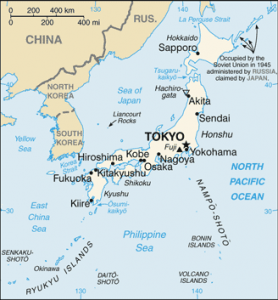Tokyo Metropolitan health officials reported the death of a 6-month-old Adachi child from infant botulism after he was fed honey, according to a Japan Times report.
According to the report:
The Adachi boy died March 30. He developed a cough on Feb. 16, and was taken to a hospital by ambulance on Feb. 20 after going into convulsions and suffering respiratory failure. He was diagnosed Feb. 28 as having infant botulism.

Image/CIA
The family gave him honey daily mixed in juice twice a day for a month. They said they were unaware that you shouldn’t give honey to a child less than one year of age.
Officials said it was the first death caused by infant botulism in Japan since 1986.
In the U.S., there are approximately 100 cases of infant botulism reported annually. It is the most common form of botulism. It affects children under 12 months of age, with most cases being in infants 6 weeks to 6 months.
Unlike food borne botulism, where the person ingests preformed toxin in food, the infant ingests the spores of the bacteria in food stuffs like honey. The spores germinate in the intestine where they produce the bacteria, which in turn reproduce and release the toxin.
The bacteria can colonize in the infant’s intestines because normal bowel bacteria, which would compete with the botulism bacteria aren’t fully established.
Because honey can contain spores of Clostridium botulinum, infants under 1 year old should not be fed honey.
Symptoms in the infant can start as constipation, weakness, poor suck, and a loss of head control. It can range from mild illness to sudden infant death. Disease is typically more severe in infants less than 2 months of age.
Related:


This is also why honey should not be fed to the elderly, above 75 years age. The immune system becomes impaired in the elderly. Honey should also not be fed to anybody else with impaired immune system function, such as those with AIDS or on cancer chemotherapy.